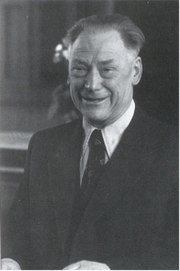Gustavs Vanags
Gustavs Vanags | |
|---|---|
 | |
| Born | 10 March 1891 |
| Died | 8 May 1965 (aged 74) |
| Nationality | Latvian |
| Alma mater | University of Latvia |
| Known for | Contribution to diketone chemistry |
| Awards |
|
| Scientific career | |
| Fields | Chemistry (organic) |
| Institutions | |
| Academic advisors | Paul Walden |
| Doctoral students | |
Gustavs Vanags (10 March 1891 — 8 May 1965) was a Soviet and Latvian organic chemist, full member of Latvian SSR Academy of Sciences. He was also one of the signers of the Memorandum of Latvian Central Council in 1944.
Biography
[edit]Gustavs Vanags was born in "Rungas" house of the Schnicken (Sniķeru) manor (now in Ukri Parish, Auce Municipality). He received primary education in the Mitau Classic Gymnasium, and in 1910 enrolled Riga Polytechnic Institute. During the First World War, he, among many, went in evacuation to the inner regions of Russian Empire; after returning from it in 1921, he completed his education in the new-founded University of Latvia and worked at the Faculty of Chemistry, raising to the position of the chair of the Department of organic chemistry. He received his habilitation in 1932.
After Riga Polytechnic Institute was reestablished in 1958, G. Vanags moved to it, serving in the same position as the department chair until 1965. Simultaneously he also worked in the State Institute of Organic Synthesis, where he carried out his research in the chemistry of cyclic β-diketones. He was founder of Riga scholl of organic chemists specializing on β-diketones, which continues up to day (2020). Gustavs Vanags, along with his students, designed and synthesized several compounds of notable application in medicine, agriculture and chemical analysis (omefin, bindon,[1] nitroindandione,[2] rhodenticide diphenadione or ratindan).
Gustavs Vanags died in a sudden death on May 8, 1965, in Riga. He was buried in the Forest Cemetery.[3]
Commemoration
[edit]Latvian Academy of Sciences named a biannual prize for advances in chemistry in Gustavs Vanags' name.
A commemorative plaque with bas-relief of G. Vanags is installed in the hall of Riga Technical University Faculty of Chemistry. A commemorative stone is erected at the place where his native house of "Rungas" once stood.[4]
References
[edit]- ^ "Bindone". PubChem. Retrieved 3 April 2020.
- ^ Simonsen, Ole; Jacobsen, Jens P. (1977). "The crystal and molecular structure of 2-nitro-1,3-indandione dihydrate. A hydronium nitronate". Acta Crystallographica B. B33 (10): 3045–3049. doi:10.1107/S0567740877010231.
- ^ "Izstāde Gustavs Vanags un organiskā ķīmija Latvijā". Archived from the original on 26 September 2011. Retrieved 19 January 2013.
- ^ "Piemiņas vietas" (in Latvian). Auce Municipality. Retrieved 3 April 2020.
External links
[edit]- 1891 births
- 1965 deaths
- Organic chemists
- 20th-century chemists
- People from Auce Municipality
- People from Kovno Governorate
- People from Zemgale
- Academicians of the Latvian SSR Academy of Sciences
- Riga Technical University alumni
- Academic staff of Riga Technical University
- University of Latvia alumni
- Academic staff of the University of Latvia
- Recipients of the Order of the Red Banner of Labour
- Latvian chemists
- 20th-century Latvian inventors
- Soviet chemists
- Soviet inventors
